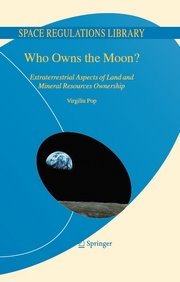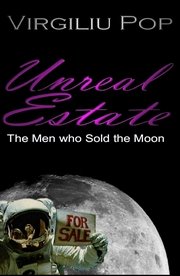
Daniel Mediavilla interviewed me:
Virgiliu Pop, investigador en la Agencia Espacial Rumana y autor del libro Who Owns the Moon? ("¿de quién es la Luna?"), cree que los tratados de las Naciones Unidas en el espacio exterior y la idea de compartir los recursos espaciales como un bien común "han retrasado el desarrollo de una economía espacial". En su opinión, el desarrollo de leyes que posibilitasen la apropiación privada de los recursos espaciales beneficiarían a todas las naciones, incluso a los países más débiles. "Asegurar los derechos de propiedad sería un pequeño precio a pagar, mucho más beneficioso para la humanidad que dejar el entorno espacial sin desarrollar", asegura.
Tuesday, December 30, 2008
Publico.es: Fiebre del oro en el espacio
Monday, December 29, 2008
ADN.es: ¿De quién es la Luna?

From adn.es:
Según Virgiliu Pop, un especialista de la Agencia Espacial Rumana, que acaba de publicar "Who Owns the Moon? - Extraterrestrial Aspects of Land and Mineral Resources Ownership" (Springer, 2008), las normas y reglas relativas a las propiedades extraterrestres están muy limitadas, ni siquiera son capaces de definir conceptos básicos como, por ejemplo, qué es un cuerpo celeste.
En su opinión establecer derechos de propiedad es la solución más aconsejable. Dejando al margen sus nobles ideales, el Tratado Lunar presenta más inconvenientes que ventajas. Los planes de regreso a la Luna van a hacer que la cuestión de la propiedad en el espacio exterior se concrete en nuevas normativas.
Friday, December 26, 2008
Forskning.no: Hvem eier månen?

Ingunn Haraldsen writes:
Nå har forsker og jurist Virgiliu Pop skrevet bok den manglende eiendomsretten i det ytre rommet. ... Nå hevder forsker og jurist Virgiliu Pop ved Det rumenske romfartssenteret (ROSA) at dagens konvensjoner som regulerer månen er svært begrenset. Pop er en av verdens fremste eksperter på jus i verdensrommet. Pop påpeker at konvensjonen ikke tematiserer landrettigheter på månen, og at dette vil bli et problem om en 15 års tid. Pop foreslår en utvikling av eiendomsretten i verdensrommet. Han diskuterer hvorvidt dette bør gå via det nasjonale lovverket. Kollektivt eierskap har han liten tro på. -Tross noble idealer om likhet for alle, har prinsippet om fellesarven i Moon Treaty flere mangler enn fortrinn, sier han til SPACE.com. I boken diskuterer han også hvorvidt noen eier asteroidene og kometene, eller om disse "flytende godbitene" er fritt vilt for erobringsvillige romfartsaktører. ... Tandberg deler Pops vurdering om at dagens Moon Treaty er for upresis på en rekke områder.
Thursday, December 18, 2008
Fantascienza.com: In Romania qualcuno si chiede: di chi è la luna?

Alessandro Mure, from the Corriere della Fantascienza, writes:
Mentre riparte la corsa allo spazio, uno studioso dell'Agenzia Spaziale romena pone la questione della proprietà del suolo lunare ... E poi ci sono anche le ambizioni spaziali di Israele, Iran, Corea del Sud, Brasile e altri contendenti minori. Con un simile affollamento di presenze sulla Luna in un futuro più o meno lontato, qualcuno si è giustamente chiesto come verrà spartito l'eventuale bottino del suolo. Chi? La Nasa? La Esa? No. L'Agenzia Spaziale Romena. Non è uno scherzo: è appena uscito il volume Who Owns the Moon? — Extraterrestrial Aspects of Land and Mineral Resources Ownership (Springer, 2008) scritto da Virgiliu Pop, specialista dell’Agenzia Spaziale Romena. Lo studio è serissimo e si schiera contro il Moon Treaty del 1979 in cui si sanciva il principio della luna come patrimonio comune (e infatti non è stato ratificato da nessuna delle nazioni con serie ambizioni lunari). Pop professa con convizione la necessità di stabilire anche sulla luna il diritto di proprietà, perché “lo spazio è una frontiera che favorisce più l’individualismo che il collettivismo, e tali sfide devono essere affrontate approntando un regime legale adatto”.
Tuesday, December 16, 2008
Romanian Experts - An interesting debate
My space.com interview raised some interesting questions - not only on lunar property rights, but also on national pride or shame:
Un roman, expert in probleme "lunare" (Joi, 11 decembrie 2008, 17:41)
Cifrus [anonim] Publicatia "Live Science" il citeaza chiar zilele acestea pe compatriotul nostru Virgil Pop, ce a scris o carte despre posibila exploatare comerciala, capitalista, a Lunii. "Who Owns the Moon? - Extraterrestrial Aspects of Land and Mineral Resources Ownership" (Springer, 2008) Iar aici aveti articolul: http://www.livescience.com/space/081210-who-owns-moon.html. E totusi o mica mandrie pt. Romania ca un roman e consultat in astfel de probleme ! Astfel de satisfactii sunt rare si merita remarcate.
hai sa ne fudulim (Joi, 11 decembrie 2008, 18:26)- rica venturiano [utilizator]
Am ajuns sa avem o parere atat de proasta despre noi incat si un interviu luat de o publicatie straina unui roman sa ni se para un motiv de mandrie pentru Romania? Sa inteleg ca specialistul respectiv (pentru care am tot respectul, sa nu se inteleaga gresit) a vorbit in calitate de reprezentant al Romaniei? Cand o sa pricepeti ca daca un roman realizeaza ceva, meritul e al lui, nu al vostru?
hai sa ne mandrim (Joi, 11 decembrie 2008, 19:12)romanescu [anonim] i-a raspuns lui rica venturiano- Vom "pricepe" asta cand presa si multi dintre romanii complexati vor realiza ca atunci cand un roman violeaza, fura sau omoara, de vina nu sunt "romanii" si "un roman" ! Clar? Fiecare tara, inclusiv printre cele mai mari din lume, promoveaza realizarile "individuale" ale cetatenilor sai. Sau faptul ca un francez ia un premiu, e citat, e dat ca referinta, nu crezi ca e o mandrie pt. francezi sau pt. Franta? Sau habar n-ai ca legiunea de onoare se da pt. merite "individuale"? Suntem multi satui de manelisme si complexe de inferioritate, de stiri de ora 5, promovate cu sadism si masochism national de o parte a presei si ne bucuram sincer ca mai apar si astfel de informatii. Multumesc lui Cifrus!
luxdesign28 [utilizator] i-a raspuns lui rica venturiano salut nu e fudulie. La un alt nivel de constiinta se considera ca noi, respectiv romanii suntem ca un organism. Se pot considera partile sanatoase realizarile pozitive ale conationalilor, respectiv partile bolnave, involutiile acelorasi conationali de-ai nostri. Trebuie sa ne asumam atat partile pozitive, cat si partile negative. Ideea este ca un roman, un englez, un francez, sau orice alta natie am lua, nu-si va putea renega niciodata tara, chiar si daca ar vrea sa o faca... o va avea in sange si in suflet :)
Sunday, December 14, 2008
Laughing mad: Certificate of future ownership of Epsilon Eridani b
Do you want a "certificate of Future ownership, assuming that you and or an ancestor can take possession of" Epsilon Eridani b? Do you know that "No one owns space because no one has claimed it…. Yet!"? Then, visit e-bay, where you will learn, from capcan74, that, according to one Virgiliu Pop, author of "Who Owns the Moon?” - Extraterrestrial Aspects of Land and Mineral Resources Ownership" (Springer, 2008),
"Space is indeed a new frontier calling for individualism rather than collectivism, and its challenges need to be addressed with a legal regime favorable to property rights." and "Property rights are a useful engine and, in all likelihood, a precondition for pushing forward the development of the extraterrestrial realms".
Therefore,
"You have already missed out on the Moon, Mars is next to go. Are you going to leave your Ancestors out of the Final Frontiers land-rush! The United Nations has declared that celestial bodies may not be claimed by any Nation, but as an individual you can!"
Well, dear capcan74, if you knew any better, you'd read more about my stance on "unreal estate" and you'd know that space, and celestial bodies, have been claimed by countless individuals, city councils, and schools. You'd learn that homesteading the final frontier does not mean simply claiming a planet, and that my name should not be used as an endorsement of such empty claims.
As for your fear of "leaving your ancestors out of the final frontier", I have excellent news - Celestis provides excellent space funerals!
Saturday, December 13, 2008
The Voloch Conspiracy: Property Rights on the Moon

Ilya Somin, Assistant Professor of Law at the George Mason University, writes:
"Romanian space law scholar Virgiliu Pop ... is a strong supporter of private property rights. As Pop suggests, private property rights on the Moon would have many of the same benefits as here on Earth. They stimulate investment, innovation, and competition. Perhaps even more important, they prevent the wanton destruction and overuse of valuable resources through a tragedy of the commons. I previously made the case for private property rights in space ..., raising several points similar to Pop's arguments.
More here.
Softpedia: Property Rights for the Moon - Romanian scientist shares his thoughts on space laws

Dan Talpariu, science editor at Softpedia, writes:
"[N]ot much thought has been given to the legal aspects linked to the ownership of the places we are exploring and will someday own. But a book written by a research specialist from the Romanian Space Agency, Virgiliu Pop, called "Who Owns the Moon? – Extraterrestrial Aspects of Land and Mineral Resources Ownership," plans to change that. He believes that future generations of legal representatives may have their hands full soon. ... In Pop's view, property rights are better than group ownership."
Friday, December 12, 2008
io9: Moon’s Future Lies in Frontier Homesteading, Not Collective Ownership

Lauren Davis, from io9, has this to say:
According to a prominent researcher on the subject, lunar property rights should be strictly first come, first served.... The UN’s so-called Moon Treaty declares that the moon is part of mankind’s common heritage, and would ban ownership of any extraterrestrial party, but the treaty has never passed and has not been ratified by any nation with a space program. According to Virgiliu Pop, that’s all for the best, since the UN has the wrong idea. Pop is a Romanian space lawyer who has written extensively on the topic of lunar property. His latest book Who Owns the Moon? Extraterrestrial Aspects of Land and Mineral Resources, Pop explores the possibility of creating a legal framework for property and natural resources law on the moon. At the heart of this exploration is the notion that energetic individuals, rather than international coalitions, will need to claim property in order to advance the cause of extraterrestrial colonization. ... He also challenges the notion that homesteading will favor citizens of wealthy nations, whose public and private enterprises have the resources and technology to travel into space ... Pop’s ultimate concern is that, without the development of a legal framework for lunar property rights, the moon will remain largely undeveloped. But, with more and more private companies looking into space travel, it may be a necessary to establish rights for private systems simply to ensure that laws are in place before the first settlers stake their claims. If the international community can develop a cohesive and enforceable framework, it could help keep the lunar frontier from descending into the wild West.
Thursday, December 11, 2008
Instapundit
 Glenn Reynolds, the famed Instapundit, directs his readers to "SOME THOUGHTS ON WHO OWNS THE MOON, from Virgiliu Pop. It’s a subject I’ve discussed myself."
Glenn Reynolds, the famed Instapundit, directs his readers to "SOME THOUGHTS ON WHO OWNS THE MOON, from Virgiliu Pop. It’s a subject I’ve discussed myself."
Yahoo News: Who Owns the Moon?
 Leonard David's interview with me is now available on Yahoo News as well.
Leonard David's interview with me is now available on Yahoo News as well.
The Launch Pad - Who Owns the Moon?
 Jean Levasseur at "The Launch Pad", the blog of the famed X-prize, comments on the latest space.com interview: Our friend Leonard David, writer for Space.com, just posted an article to LiveScience about Who owns the Moon? http://www.livescience.com/space/081210-who-owns-moon.html This is obviously a very important question for the Google Lunar X PRIZE teams.
Jean Levasseur at "The Launch Pad", the blog of the famed X-prize, comments on the latest space.com interview: Our friend Leonard David, writer for Space.com, just posted an article to LiveScience about Who owns the Moon? http://www.livescience.com/space/081210-who-owns-moon.html This is obviously a very important question for the Google Lunar X PRIZE teams.
In Retrospect - Σε ποιον ανήκει το φεγγάρι

Greece may be in political turmoil, but "In Retrospect", a Greek blog, debates the question of lunar ownership:
"Ο Virgiliu Pop είναι ένας ειδικός ερευνητής της Ρουμανικής Διαστημικής Υπηρεσίας. Εδώ και χρόνια εξετάζει τις νομικές παραμέτρους στον τομέα των δικαιωμάτων ιδιοκτησίας στο διάστημα και το νέο του βιβλίο με τίτλο «Who Owns the Moon? - Extraterrestrial Aspects of Land and Mineral Resources Ownership» (εκδόσεις Springer, 2008) κυκλοφόρησε τον περασμένο μήνα.
Ο Pop ερευνά τα στοιχεία που έχουν διαμορφώσει το νόμο της εξωγήινης ιδιοκτησίας και τους κανόνες που εκφράζουν αυτό το νόμο. Και κατά την άποψή του, οι συνθήκες και οι κανόνες που αφορούν στα δικαιώματα ιδιοκτησίας του γήινου κόσμου είναι κάπως περιορισμένα, αποτυγχάνοντας να καθορίσουν ακόμα και βασικά στοιχεία, όπως ο ορισμός του αστρικού σώματος."
Futurismic - The Lunar landgrab - who owns the Moon, anyway?

From Paul Raven at Futurismic:
"Once we start colonising our sister satellite - whether in person or via robot proxies - how do we decide who the territory belongs to?
Luckily for us, one Virgiliu Pop is already on the case. He’s a research specialist at the Romanian Space Agency (Romania has a space agency? Who knew?) who has been looking into the laws that might, by precedent, affect lunar settlements… and he reckons it’s rugged individualism and the pioneer spirit that will win the day:
“Homesteading is likely to transform the lunar desert in the same manner as it transformed the 19th Century United States,” he said. “Space is indeed a new frontier calling for individualism rather than collectivism, and its challenges need to be addressed with a legal regime favorable to property rights.”
As many empires have learned the hard way, maintaining control over distant colonies is no easy trick - and when the colony is at the other end of a steep gravity well, that’s only going to be more true. Anyone fancy a sweepstake on the period between first Lunar colony and first colonial secession?"
Wednesday, December 10, 2008
Spaceports - Virgiliu Pop: Who Owns The Moon

From Spaceports, Jack Kennedy's space blog:
Romanian lawyer Virgiliu Pop has a new book entitled Who Owns the Moon?: Extraterrestrial Aspects of Land and Mineral Resources Ownership now available via Amazon.com.
The author's work investigates the permissibility and viability of property rights on the celestial bodies, particularly the extraterrestrial aspects of land and mineral resources ownership. In lay terms, it aims to find an answer to the question "Who owns the Moon?"
Leonard David provides more about Pop's latest book with an article in Space.com today. This Blogger ordered the book yesterday after reading his first space property rights book Unreal Estate - The Men who Sold the Moon in 2007.
The Technology Liberation Front - "Who Owns the Moon"?

Berin Szoka, a libertarian space lawyer and friend of mine, comments on the space.com story just in, and on my new book:
"My Romanian space lawyer (and improbably-named) friend Virgiliu Pop has made the front page of Space.com today in a great interview with leading space journalist Leonard David about his new book Who Owns the Moon?: Extraterrestrial Aspects of Land and Mineral Resources Ownership. Virgil slams the “Common Heritage of Mankind” socialism behind the 1979 Moon Treaty, which was killed in the U.S. Senate by the free-market space movement, which later gave birth to the Space Frontier Foundation (which I chair).
Virgil once famously claimed ownership of the sun to demonstrate the absurdity of serious assertions made by a number of charlatans to ownership of lunar territory (Dennis Hope) or the entire Eros asteroid (Greg Nemitz). Virgil’s point was “to show how ridiculous a property rights system in outer space would be if it were to be based solely on claim unsubstantiated by any actual possession.”
I’m looking forward to reading Virgil’s book–and to writing a proper review. For now, I’ll just say that I think Virgil and I see eye-to-eye (something of a rarity among space lawyers on the ultra-contentious issue of property rights):
1. The Outer Space Treaty of 1967 prohibits nations from approriating territory in space and also prohibits individuals from asserting any territorial claims (generall accepted) except to a narrowly-limited area under actual use (not accepted by all space lawyers).
2. The Outer Space Treaty, properly understood, does not bar claims to ownership of movable objects such as extracted resources or even (if they can be moved in a meanginful way) entire asteroids or comets.
3. Securing such property rights is essential to the economic development of space."
More here
Space.com - "Who Owns the Moon?"

I am interviewed by the famed space journalist Leonard David for the front page of space.com:
Virgiliu Pop is a research specialist at the Romanian Space Agency. He has for years been keeping a legal eye on the area of space property rights, and his new book, "Who Owns the Moon? - Extraterrestrial Aspects of Land and Mineral Resources Ownership" (Springer, 2008) was published this month.
Pop has been delving into what has shaped the law of extraterrestrial real estate, and the norms which express this law. ... Pop favors property rights over group hugs.
"Despite the noble ideals of equity and care for the have-nots, the Common Heritage paradigm of the Moon Treaty has more faults than merits," Pop told SPACE.com.
"A refutation of the Common Heritage principle does not mean, however, that the developing world will, or should, be left behind in the space era," he said. "China, India and Brazil are living proofs that a developing country can, through its own effort, join the spacefaring club. Instead of freeloading on the efforts of the older spacefarers, the have-nots should pool their meager financial resources into a common space agency or into regional ones, and proceed at exploiting the riches of outer space for themselves."
More here








